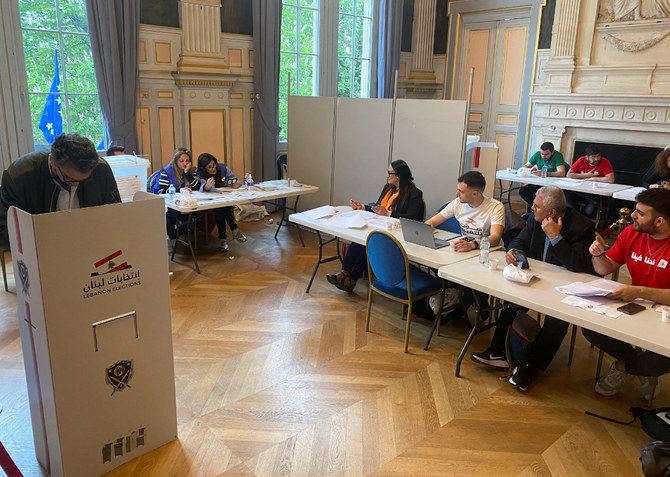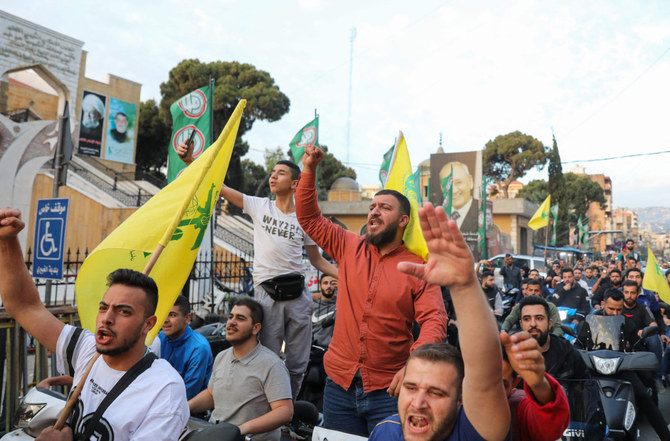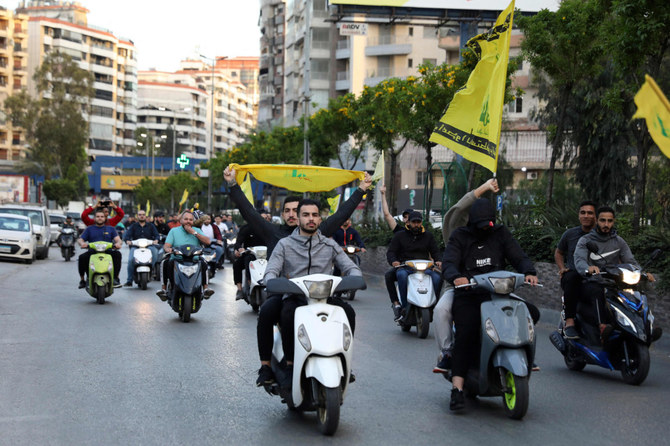Najia Al-Houssari
BEIRUT: There was almost a 60 percent voter turnout for Lebanon’s diaspora ahead of parliamentary elections on May 15, officials said Monday.
The Ministry of Foreign Affairs said that between 128,000 and 130,00 Lebanese expatriates out of 225,000 registered voters had cast their ballots.
The percentage of expat voters in 2018 was close to 56 percent when about 46,000 out of 82,000 registered voters cast their votes.
Observers of the electoral process said the expat turnout “did not live up to expectations because the people who registered to vote abroad had a personal desire to vote, but it seems that many of them abandoned that later.”
The expat elections that began on Friday in Iran ended at dawn on Monday in the last polling station on the US West Coast.
The highest turnout was recorded in Syria, reaching 84 percent, while the lowest was in Iraq.
“This percentage of the electoral cycle is good,” said Hadi Hashem, director of expat affairs at the ministry.
He described the electoral process abroad — the second of its kind after the 2018 elections — as “the largest logistical operation in the modern history of Lebanon, which involved 58 countries, 205 mega-centers, 598 polling stations, more than 2,000 employees, and 250 diplomats who worked day and night nonstop.”
The overseas ballots will be sent to Beirut for counting when polls close after nationwide voting on Sunday.
The electoral process will choose 128 MPs, and the percentage of polling abroad presents the candidates with a challenging week to mobilize their supporters for Sunday’s elections.
The ministry waited for the return of the ballot boxes from abroad on Monday via DHL by air, except for the Russia box.
Lebanon’s ambassador to Moscow Shawki Bou Nassar is personally taking it to Beirut at dawn on Tuesday because DHL does not deal with Russia.
The ballot boxes will be deposited in the Central Bank in preparation for sorting on Sunday night.
According to preliminary disclosures on the voter lists, the percentage of voters in the UAE and France reached about 70. It was 59 percent in Germany. In Britain it was 75 percent, in North America it was around 50 percent, and it was around 54 percent in Australia.
Observers expected that the current week in Lebanon would be electorally hot in preparation for holding the polls for state employees on Thursday, followed by the elections for the general public on Sunday.
Those taking part in the polls have begun calculating the impact of the expat vote and whether the volume of participation might upset equations and produce unexpected results.
The head of the electoral machine for the “Beirut Confronts” list, former MP Salim Diab, told Arab News that the electoral machines could not capture the trends of voters through the expat ballot boxes.
“What we have now are numbers about the voting percentage, not who the voter voted for. It is difficult to know that now. But everyone tends to bring about change.”
Diab said that former Prime Minister Saad Hariri, who suspended the political activities of his Future Movement party, had given people the freedom to choose whomever they found appropriate and provided them with many options through the electoral lists.
“However, according to our follow-up to the mood of voters in Beirut, the battle has become between two or three lists. This battle requires a lot of effort from now until next Sunday,” he added.
On Thursday, 15,000 employees from official institutions are scheduled to vote.
It is unclear to what extent their worsening living conditions will affect their choices in light of the collapse in the value of their salaries and the devastation of their living standards.
However, thousands of them are affiliated with traditional parties or have been employed by these parties in government institutions.
The Lebanese Association for Democratic Elections said its observers recorded “cases of pressure on voters by some political parties, which led to some problems in more than one place.”
LADE’s report on Monday summarized alleged violations during the expat elections.
Among those who committed this kind of violation were the “Amal movement, Hezbollah, the Free Patriotic Movement, the Lebanese Forces Party, and the Islamic Charitable Projects Association.”
The intensity of polling abroad was concentrated on the lists of Beirut’s first and second districts, the third northern district, and the Chouf and Aley districts, which observers believed to be in the interest of the change and opposition forces, despite attempts by those in authority to play the partisan and sectarian cards.
This polarization will be evident on Tuesday when Parliament Speaker Nabih Berri, the candidate at the head of a list of the Amal Movement with Hezbollah in the south, will speak.
Hezbollah secretary-general Hassan Nasrallah is urging the party’s supporters in the south, the southern suburbs of Beirut, and Baalbek-Hermel to back the party and its allies.
He claimed that the electoral battle was “a fateful battle for the resistance and its weapons in the face of foreign agendas hostile to the axis of resistance in Lebanon and the region.”
























